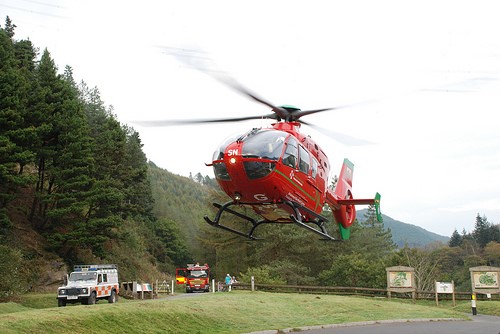Article by Victoria Paris, National Assembly for Wales Research Service
In late April 2015 the Emergency Medical Retrieval and Transfer Service (EMRTS) Wales will be launched for a 12 month trail. After the initial 12 months the service will be assessed and evaluated as to how it can be rolled out further. A Plenary debate on the EMRTS Wales is scheduled for Tuesday 21 April. [caption id="attachment_3588" align="alignright" width="300"] Image from flickr by Richard Szwejkowski. Licensed under Creative Commons[/caption] Following the recruitment process, the EMRTS Wales service will be delivered by a team of highly-trained NHS doctors from emergency medicine, anaesthesia and intensive care, working jointly with critical care paramedics from the Welsh Ambulance Service NHS Trust. EMRTS Wales will be responsible for:
Image from flickr by Richard Szwejkowski. Licensed under Creative Commons[/caption] Following the recruitment process, the EMRTS Wales service will be delivered by a team of highly-trained NHS doctors from emergency medicine, anaesthesia and intensive care, working jointly with critical care paramedics from the Welsh Ambulance Service NHS Trust. EMRTS Wales will be responsible for:
- Responding to medical and traumatic emergencies at the scene, including providing medical support at major incidents and mass casualty events;
- Stabilising and transferring time-critical patients from district general hospitals to specialist centres;
- Critical care support - providing enhanced stabilisation and transferring mothers and babies;
- Providing road and air support to rapidly transfer neonatal teams to time-critical life threatening emergencies.
- Paediatric retrieval – transferring time-critical patients (currently undertaken by the referring hospital).
The EMRTS service will treat, stabilise and transfer the most seriously-ill and injured patients to hospital by air and road. The service will use the three existing Wales Air Ambulance (WAA) charity air ambulances, which will be in addition to the charity’s existing helicopter emergency medical service (HEMS) operations across Wales, and will also be using state-of-the-art Rapid Response Vehicles (RRVs). The EMRTS Wales critical care team will also:
- Provide blood and blood products, such as plasma, at the scene of an emergency – a unique feature for Wales and not available outside the military elsewhere in the world. This is being delivered in close collaboration with the Welsh Blood Service;
- Carry casualties on the RRVs - another first for Wales;
- Carry advanced diagnostic equipment, including ultrasound and blood clotting analysers;
- Use an integrated data collection system so the hospital or control room can be live linked to the casualty via mobile telecommunications equipment.
The EMRTS Wales critical care team will operate by road and air 12 hours a day from the WAA Swansea and Welshpool airbases and with the cars being based strategically across Wales. The Deputy Minister for Health, Vaughan Gething AM, stated that ‘we will be able to effectively send the emergency room to the patient’. It is believed the service will help the WAA charity save even more lives. The service will serve all of Wales and will be able to reach 95 per cent of the population by air and 46 per cent by road within 30 minutes. It has been estimated that the service could contribute to at least a 40 per cent improvement in survival rates from major trauma in Wales and could reduce transfer times to specialist hospital care by more than 40 per cent. Dr Rhys Thomas from EMRTS has stated that:
The critical care team is an incredibly talented pool of people from across Wales and beyond. This is the first time this level of training has ever been undertaken outside of the military. With pioneering new equipment and blood products on board as well, the new recruits will create a critical care team with some of the most advanced treatments and clinical skills in the world.
Dr Dinendra Gill, consultant in emergency medicine, Morriston Hospital has stated:
The key thing is that this service is going to deliver critical care or enhanced care to the patient. So these are […] interventions that are currently done once the patient gets to the emergency department, intensive care unit or theatre and what we are doing is bringing that forward in time and doing it as close to the point the patient is injured or, for that matter, the time they have their cardiac arrest. […] It’s an exciting area to work in, it pushes people’s clinical decision making and will also make specialities in Wales more attractive.
The Welsh Government has earmarked funding of £1.9m in 2014-15 for developing the service, and recurrent revenue funding of £2.9m from 2015-16 to support the EMRTS Wales service. Further information on EMRTS Wales can be found on the Wales Air Ambulance website.






